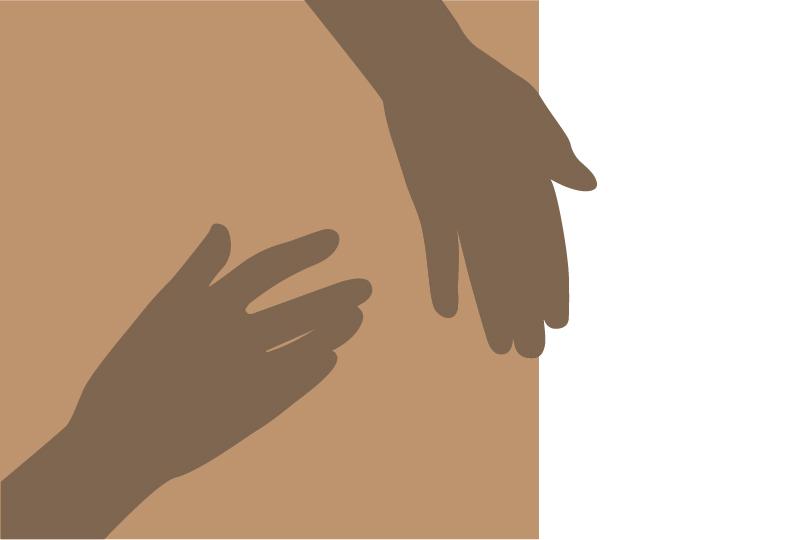There are around 250,000 migrant domestic workers in Lebanon, but they are excluded from the Labour Law, subject instead to the Kafala system. Under this system, standards and regulations for workers differ depending on their nationality. A recent GIZ study describes it as ‘a form of privatised labour regulation whereby migrants are subsumed under the authority of private employers upon their entry into the country, and then left to navigate whatever conditions or circumstances arise.’ In some families, women domestic workers do receive the benefits agreed on, such as regular breaks, annual trips home and medical insurance. Often, however, the reality on arrival is very different to what recruiters have promised them.

Surviving modern slavery
Women migrant workers in Lebanon are coping with oppression and abuse by prioritising their mental health with the support of peer advocates trained by GIZ.
In the end, Jane Njoki screamed for help from the window, pleading with passers-by in the street below. After months of abuse, she could think of no worse fate than remaining in this apartment with her employer. ‘She said: “If you shout from the window, I will push you.” I said: “Good. If I stay the year, I’ll be dead anyway.”’
When Njoki, now 51, signed a contract to clean hotels and offices with her employment agency in Nigeria, she wasn’t looking for domestic work. ‘I wanted something better,’ she says. To her surprise, she was met at Beirut Airport by a woman with a nine-year-old boy. ‘You’re going to work in my house,’ the Lebanese woman said. Njoki’s freedom evaporated in that moment.
A few months later, lack of food and warm clothing had led to a rapid decline in Njoki’s health. At night, sleeping on a balcony covered by thin glass, she shivered in her polyester uniform. In the morning, she was allowed tea, but no milk, and dry bread.
Basic rights are stripped away
Soon she would be unable to keep down any food at all, her stomach damaged by the pain killers she was given in place of the medical care she needed. ‘It was like a horror movie,’ Njoki says. Banned from leaving the apartment and denied access to a phone, she was unable to contact the agency or seek help. She couldn’t even speak with her children back home. ‘I was stranded, just like all the others,’ she says. Njoki’s situation is sadly familiar among women migrant workers in Lebanon, where basic rights are stripped away under a system that normalises racism and engenders abuse.

‘Most of the time they don’t know what they’re signing up for. They arrive in Lebanon and their identity papers are taken away by force,’ says Reem Mroueh from GIZ. Few people question this treatment in Lebanon, where having a domestic worker is seen as a necessary amenity for the middle classes.
‘Their oppression is so normalised that it’s not seen as the modern slavery it is,’ Mroueh adds. Amnesty International lists the catalogue of abuses suffered by women migrant workers in Lebanon as ‘extreme working hours and lack of rest days, severe restrictions on freedom of movement and communication, food deprivation and lack of proper accommodation, verbal and psychological abuse, and physical violence.’
Passers-by heard Njoki screaming from the window and fetched the police. She was handed back to her agency who persuaded her to accept another job, this time with a Canadian woman. Sadly, it was another abusive situation and Njoki had not been paid in months. She packed her bags and left, surviving on casual work and the kindness of strangers until a friend invited her to a mental health class run by GIZ. ‘We were shown so many support resources in those classes. We used to feel stuck, stressed, stranded. Now I know where to ask for help.’
In recent years, the COVID-19 pandemic and the economic crisis in Lebanon have intensified the difficulties for women migrant workers. Shocking footage emerged of abandoned employees dumped outside their embassies by families who could no longer afford to pay them.
GIZ initiative advocates for domestic workers
Support networks are scarce in other Middle Eastern countries where the Kafala system is in place, but Lebanon has an active civil society campaigning for change. The problem, Mroueh says, is outreach. ‘Most of them lack access to resources and don’t know about their rights or the networks that can help them,’ she says.
And this is where the Deutsche Gesellschaft für Internationale Zusammenarbeit (GIZ) GmbH comes in. On behalf of the German Federal Ministry for Economic Cooperation and Development, GIZ is supporting migrant domestic workers, sharing tools and ideas to improve psychosocial coping and recovery, and then support others. In a series of mental health and psychosocial support workshops last summer, the women learned about self-care and collective care, providing peer support and basic self-help skills for processing and overcoming difficult experiences. This creates a ripple effect, disseminating guidance to the migrant worker community. Participants also created a play, which they performed at an advocacy event attended by the embassies of their respective countries, before developing their own projects to provide support to other women.
For Njoki, the mental health sessions have given her ‘a sense of hope and a different perspective on life.’ She has now become a peer advocate and is giving other women the skills to provide psychosocial support to others in the community. ‘When you’re in a situation alone, you’re just stranded; you think this is life, it’s normal.’ Now she sees that painful experiences can be managed with community support. ‘Now I have courage and confidence, and I know where I can go to ask for help.’
